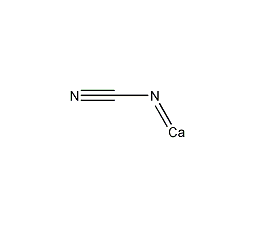
Structural formula
| Business number | 03ZU |
|---|---|
| Molecular formula | CCaN2 |
| Molecular weight | 80.11 |
| label |
herbicide, fungicides, pesticides |
Numbering system
CAS number:156-62-7
MDL number:MFCD00064894
EINECS number:205-861-8
RTECS number:205-861-8
BRN number:4124391
PubChem number:24867481
Physical property data
1. Physical property data
1. Properties: The pure product is a colorless hexagonal crystal. The impurity is gray-black and has a special odor
2. Density (g/mL, 25/4℃): 2.29
3 Melting point (ºC): 1340
4. Solubility: It can be dissolved in hydrochloric acid and generate cyanamide in water.
Toxicological data
Toxicity: LD50334mg/kg (orally in mice); 158mg/kg (orally in rats). Acute poisoning may result in organic neurological disease, limb weakness and subsequent polyneuritis. The lethal dose to humans is about 40-50g. Chronic poisoning often causes asthma-like bronchitis and bronchial wheezing, chronic gastritis and hepatitis, lowered blood pressure, myocardial malnutrition, sexual dysfunction, thyroid and adrenal gland dysfunction, and the skin will be dry, itchy, and dermatitis. Falling into the eyes can cause purulent conjunctivitis, corneal ulcers and turbidity.
Ecological data
None yet
Molecular structure data
None yet
Compute chemical data
None yet
Properties and stability
Sublimation begins at >1150°C. It is insoluble in water and hygroscopic. It decomposes into ammonia gas when exposed to water and should not be stored for a long time. Toxic to human body. It has systemic toxic effects, especially on the vasomotor center, respiratory center and blood, causing autonomic neurasthenia syndrome, as well as dysfunction of endocrine organs and basic metabolism. Insoluble in water. But it can be hydrolyzed to produce acetylene and ammonia. Sublimates at 1150~1200℃.
Storage method
It should be stored in a cool, well-ventilated and dry warehouse.
Synthesis method
1. Crush the calcium carbide, infiltrate 1-3% fluorite or calcium chloride, mix well, heat it to about 1100°C in a rotary kiln, and then add nitrogen to react to produce the product. In the nitriding method, after the calcium carbide is crushed, fluorite and returned lime are evenly added, and then ground into calcium carbide powder by a ball mill. Then it enters the nitriding furnace and reacts with nitrogen at a high temperature of 1000°C. After 42 to 48 hours, lime nitrogen is generated, and the frit is taken out. After grinding and fine crushing in a tube mill, the finished product of calcium cyanamide is obtained. The reaction formula is as follows: 2. First put pure HCN in CaCl2 and P2O5 dryer Dry in medium and then collect in a fully cooled receiver in an amount three times the theoretical amount. �� Nitrogen is bubbled into the container (preferably mixed with some ammonia) to replace HCN, and a porcelain boat containing CaCO3 is placed in the porcelain tube. When the temperature of the porcelain tube reaches 700℃ or 850℃, HCN is introduced. Raise the temperature of the HCN receiver to 18°C and heat for 3 hours to obtain the product.
2. First put pure HCN in CaCl2 and P2O5 dryer Dry in medium and then collect in a fully cooled receiver in an amount three times the theoretical amount. �� Nitrogen is bubbled into the container (preferably mixed with some ammonia) to replace HCN, and a porcelain boat containing CaCO3 is placed in the porcelain tube. When the temperature of the porcelain tube reaches 700℃ or 850℃, HCN is introduced. Raise the temperature of the HCN receiver to 18°C and heat for 3 hours to obtain the product.
Purpose
Uses: An alkaline fertilizer and one of the main raw materials of high-efficiency and low-toxic carbendazim pesticides. It can be used as herbicides, fungicides, and insecticides (to prevent the spread of schistosomiasis, root rot, rust, White mold, which can kill snails, leeches, etc.). It can also be used as a cotton defoliant and as a soil improver. It is a basic raw material for organic synthesis industry and plastics industry and can be used to produce dicyandiamide, melamine and cyanide melt.

 微信扫一扫打赏
微信扫一扫打赏

